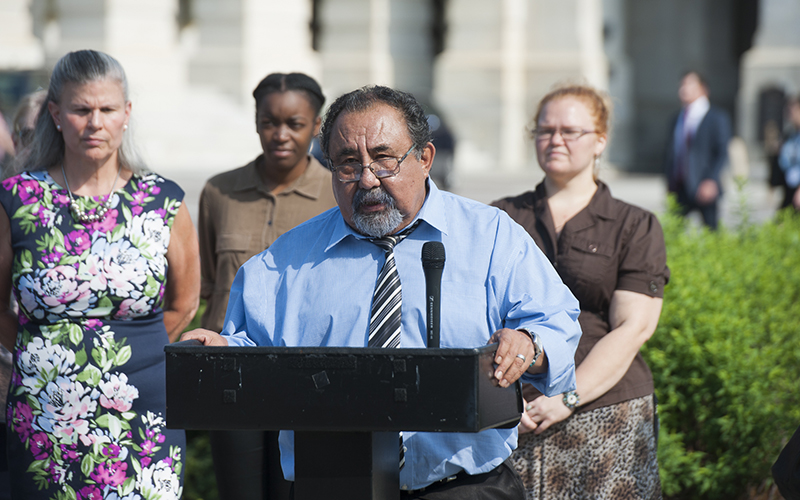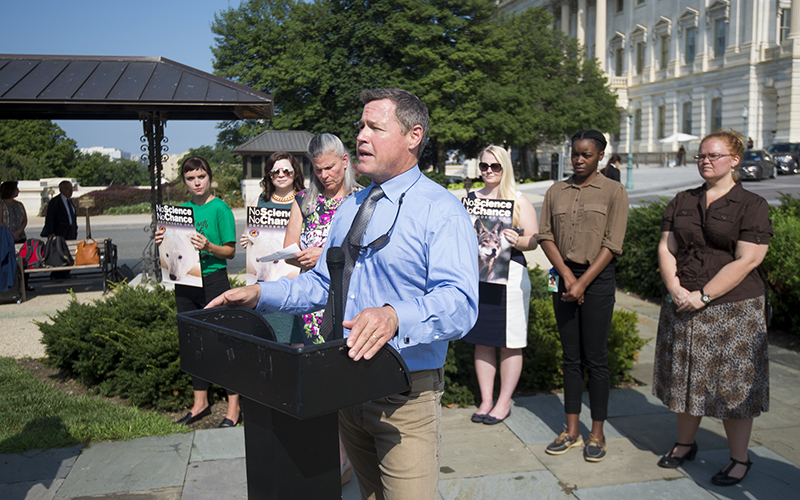
Rep. Raul Grijalva, D-Tucson, said proposed changes to the Endanged Species Act would put the goverment in the “arrogant and shameful” position of deciding which species live or die.” (Photo by Ben Moffat/Cronkite News)

Environmentalist and entertainer Jeff Corwin was at the Capitol to oppose five House bills modifying the Endangered Species Act – strengthening it or weakening it, depending on who’s talking. (Photo by Ben Moffat/Cronkite News)
WASHINGTON – Democrats and Republicans agreed Wednesday that everybody wants to prevent extinction of endangered species – but they differ sharply on how to do that.
That was the main issue as the House Natural Resources Committee took up five bills, what Rep. Raul Grijalva, D-Tucson, called a “weird menu” of measures that would modify the Endangered Species Act in ways he called a “waste of time.”
Grijalva said that for Congress to “decide which species live or die – for all time – is arrogant and shameful.”
But supporters said the bills provide badly needed updates to the Endangered Species Act, which they called a costly, cumbersome set of regulations that tries to fit a Washington-sized peg into a local-sized hole, stripping local authority.
Rep. Rob Bishop, R-Utah, the chairman of the committee, said the act had been “hijacked by litigation” that has hampered action on species.
He pointed to a lawsuit that challenged a 2012 decision by the U.S. Fish and Wildlife Service to remove the Mexican gray wolf populations in Wisconsin, Wyoming, Minnesota and Michigan from the federal list of endangered wildlife. A federal district court initially ruled against the agency in 2014, but the D.C. Circuit Court of Appeals this March allowed the rule to go back into effect.
The wolf case spurred Rep. Collin Peterson, D-Minnesota, to sponsor a bill directing the Department of the Interior to reinstate the 2012 rule and exempting the rule from judicial review. He said Wednesday that the wolf’s population had rebounded beyond original levels but that after the 2014 court ruling, farmers could not legally shoot the wolves because of their status as an endangered species, even if the wolves were attacking livestock or pets.
-Cronkite News video by Noelle Lilley
“When attacks occur, my constituents are forced to choose between following the law or protecting their livestock and livelihoods,” Peterson told the committee.
Other bills before the committee included one that would preclude nonnative species from being considered for endangered species protection, one to mandate a review of the potential economic impact of adding species to the list, another that would require data-sharing between the federal government and states, and another regarding lawsuits by citizens.
But Grijalva said attempts to modify the ESA were little more than “transparent attacks on one of the most successful and popular conservation statutes in the history of the world.” Backed by activists from Defenders of Wildlife, he blasted the bills at a news conference before the committee hearing.
Defenders of Wildlife President Jamie Rappaport Clark said preserving the act is particularly important in states like Arizona.
“Arizona has quite a few species on the brink of extinction, whether it’s the Sonoran pronghorn, the Mexican gray wolves or some of the Colorado River fishes,” Rappaport Clark said. “But all states should care about the biodiversity within their borders, and it’s only by sustaining those plants and animals that they end up having a rich fabric of life that sustains the human population as well.”
Rappaport Clark said the legislation has been very effective, preventing the extinction of 99 percent of the species it has covered.
“The Endangered Species Act is one of the most far-sighted laws ever enacted, and the United States has long been a … leader in conservation that radiates worldwide,” she said.